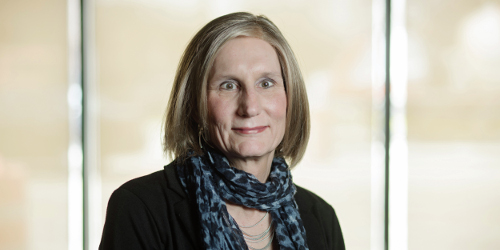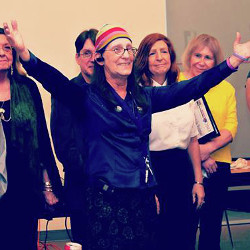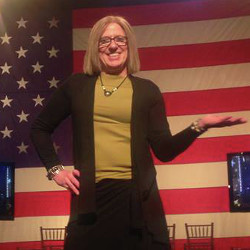By Amy Lynn Smith

Amy Hunter, a transgender woman who is spearheading the ACLU of Michiganas Transgender Advocacy Project. BTL photo: Andrew Potter
For transgender rights, 2016 is turning out to be both the best of times and the worst of times.
Significant progress has been made toward greater equality and inclusion, thanks to federal rulings affirming transgender people's rights to equal treatment in schools, healthcare access and military service. What's more, two openly transgender candidates won major-party Congressional primaries.
 Michelle Fox-Phillips, arms raised, did not have much of a support system when she began transitioning so she created one.
Michelle Fox-Phillips, arms raised, did not have much of a support system when she began transitioning so she created one.But it's impossible to ignore the worst of times. Laws like North Carolina's HB2 treat transgender people like second-class citizens : – or worse, presumed predators – and are inspiring similar "bathroom bills" in many states, including Michigan, where two such bills have been introduced.
It can often seem like it's two steps forward, three steps back — but progress will overtake backlash if Michigan activists have anything to say about it.
According to Amy Hunter, a transgender woman who is spearheading the ACLU of Michigan's Transgender Advocacy Project (TAP), that requires fostering not just activism, but advocacy.
"Activism is certainly necessary for the trans community, but advocacy is a long-term game," she says. "Advocacy is about developing relationships and a presence that leads to systematic change."
A core element of TAP is Transgender Advocacy University, which Hunter describes as an initiative "to provide transgender individuals and their close allies an in-depth training experience focused on learning how to strategically advocate for issues that directly impact our daily lives and the transgender community as a whole."
Advocacy University's first cohort included trans people and allies who are relatively new to activism, as well as long-time activists and advocates who continue honing their skills, like Michelle Fox-Phillips.
When she began transitioning in 1998 at age 50, Fox-Phillips didn't have much of a support system in place. So she created one.
"Affirmations asked me if I wanted to start a support group for transgender people and I said yes," she says. "That's when I came out of the closet and began identifying as trans."
 Char Davenport has helped pass non-discrimination ordinances across Michigan and works with the National Center for Transgender Equality.
Char Davenport has helped pass non-discrimination ordinances across Michigan and works with the National Center for Transgender Equality.Still active with Affirmations, Fox-Phillips is a tireless advocate for the transgender community. She served on the Board of Transgender Michigan, which she helped establish, and later co-founded Transgender Detroit. She also served on the Board of Crossroads and worked with the Triangle Foundation on their Equality Pride PAC (now all part of Equality Michigan), began a transgender support group for parents and allies at PFLAG Detroit, which is ongoing.
About four years ago, Transgender Detroit evolved into Gender-identity Network Alliance (GNA), with Fox-Phillips as its Executive Director.
"GNA wants to make it as easy as possible for people to transition — we want to be a service activists' organization," she says. "There are so many resources now for transgender people. Just be proud of who you are."
Another highly visible activist is Char Davenport, who has helped pass non-discrimination ordinances across Michigan and works with the National Center for Transgender Equality. She's often in Washington, D.C. lobbying her representatives, including a recent trip to support measures to curb gun violence. Due, in part, to her activism, she was invited by the Bernie Sanders Presidential campaign to attend the Sanders/Clinton Town Hall debate in Detroit.
Davenport also notably filed a federal lawsuit against Saginaw Valley State University (SVSU) for sex discrimination after losing a job because of her gender.
Davenport knows that being a visible transgender woman has its risks.
"I choose to be visible because that's my defense," she says. "If anybody's going to do anything to me, they're going to do it in broad daylight and everybody's going to know it. Choosing visibility can be dangerous. On the other hand, you want to be visible because you want to be your authentic self."
In pursuit of safe visibility and equality, the work continues. To Hunter, uniting activists and advocates is fundamental to creating long-lasting change.
"Finding the keys to equality is having a consistent presence with lawmakers – which I now have the opportunity to do – as well as other lobbyists and advocates within the LGBT community," Hunter says. "The goal of an effective advocate shouldn't necessarily be an immediate gain, but a long-term structural shift that also drives the broader cultural shift. It's critical for the trans community that we build the relational structures that give us a political voice."
Applications are now being accepted for the second Transgender Advocacy University. The deadline to enroll is August 12 and space is limited. Enroll and get more details here:
This is part two of a two-part series on transgender activists in Michigan.
Most interviews for this story were originally conducted for an ongoing series on the lives of transgender people at Eclectablog.com










